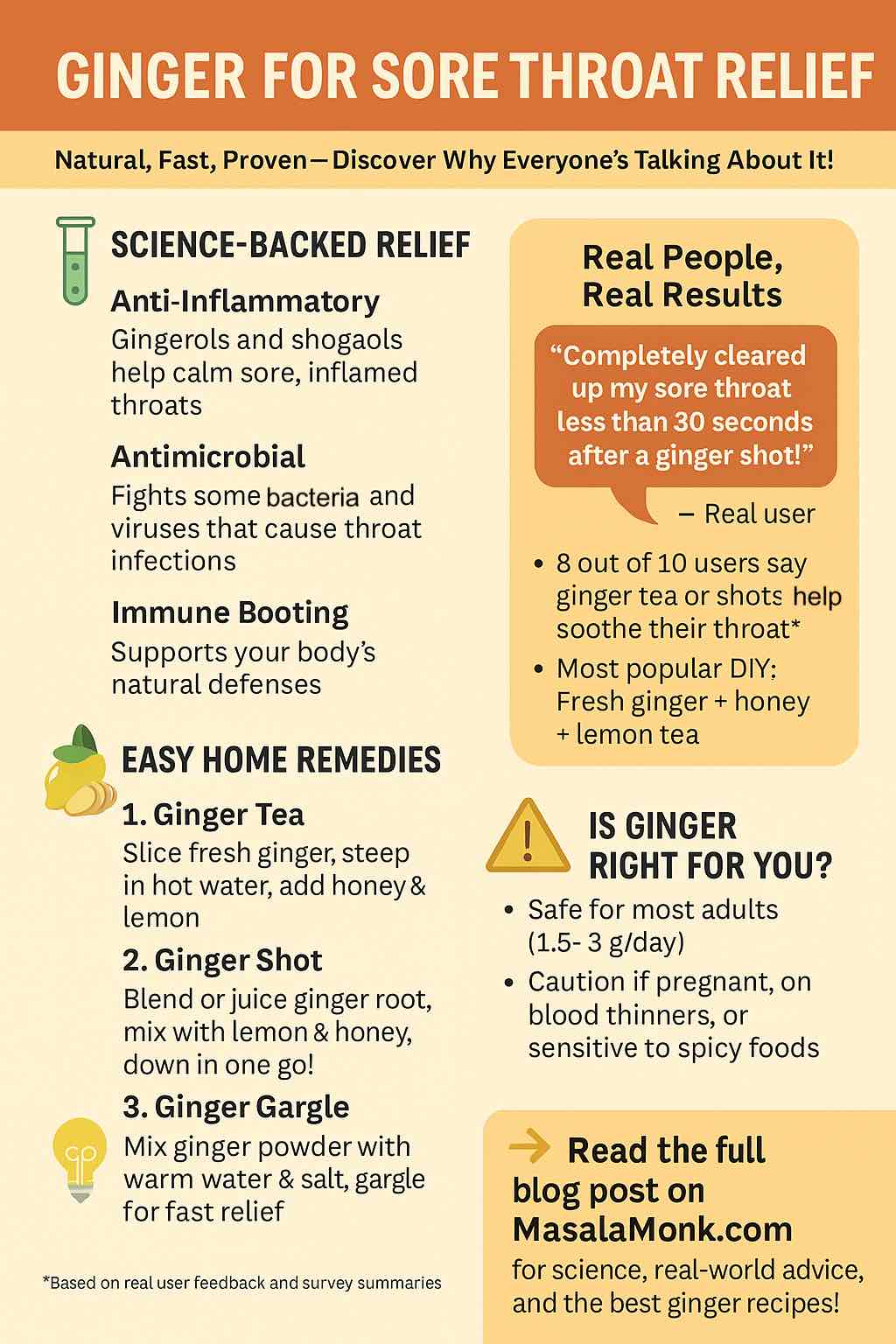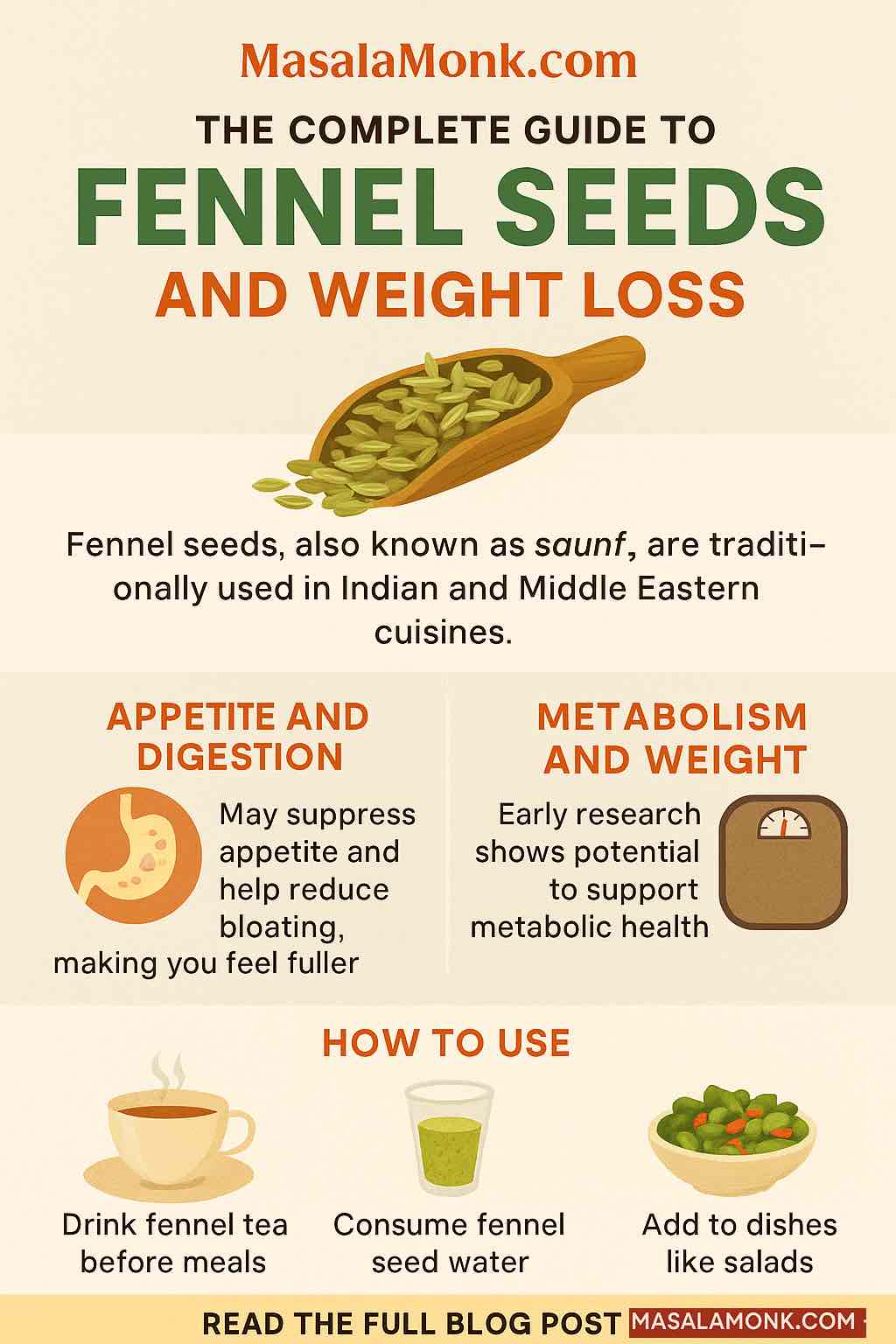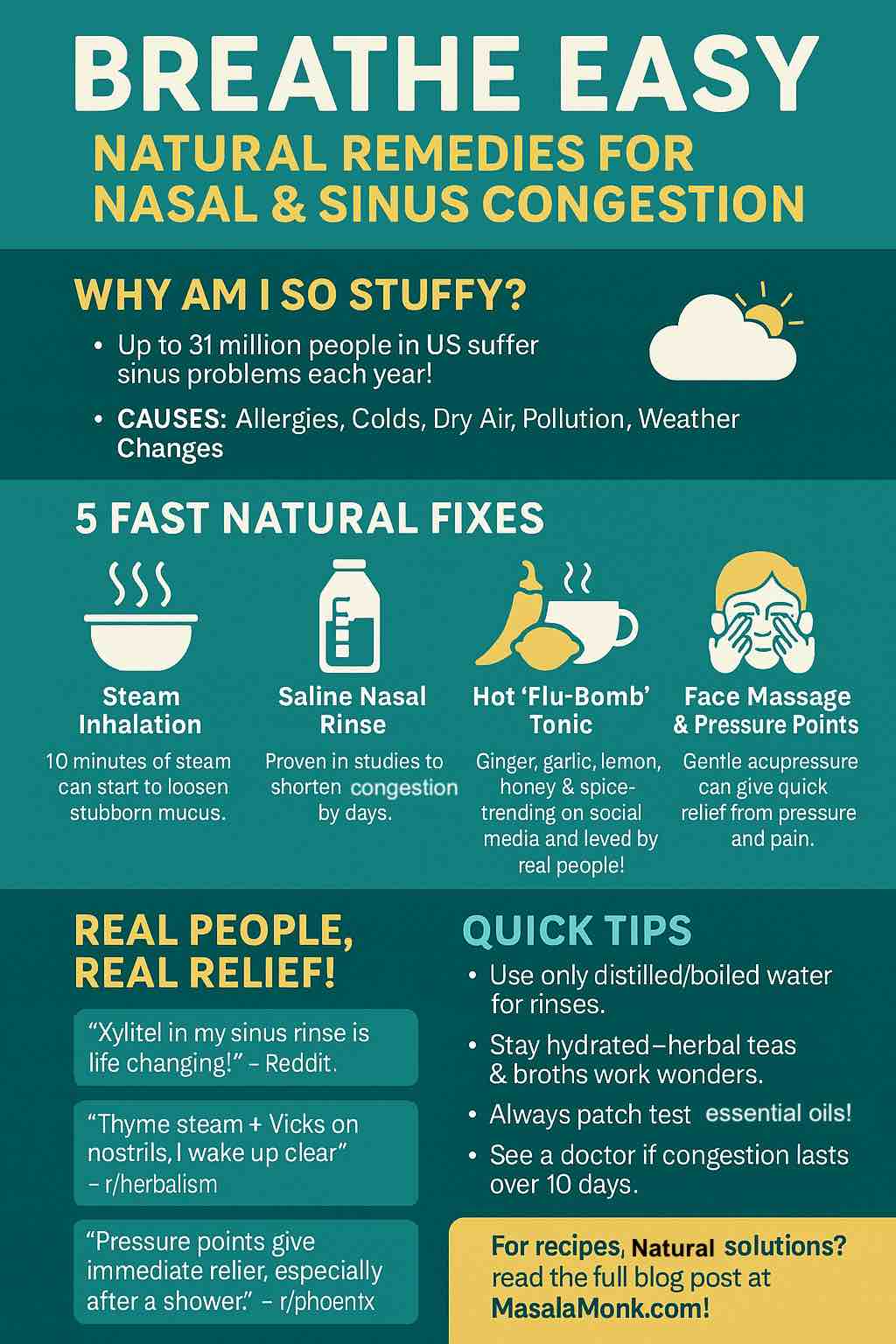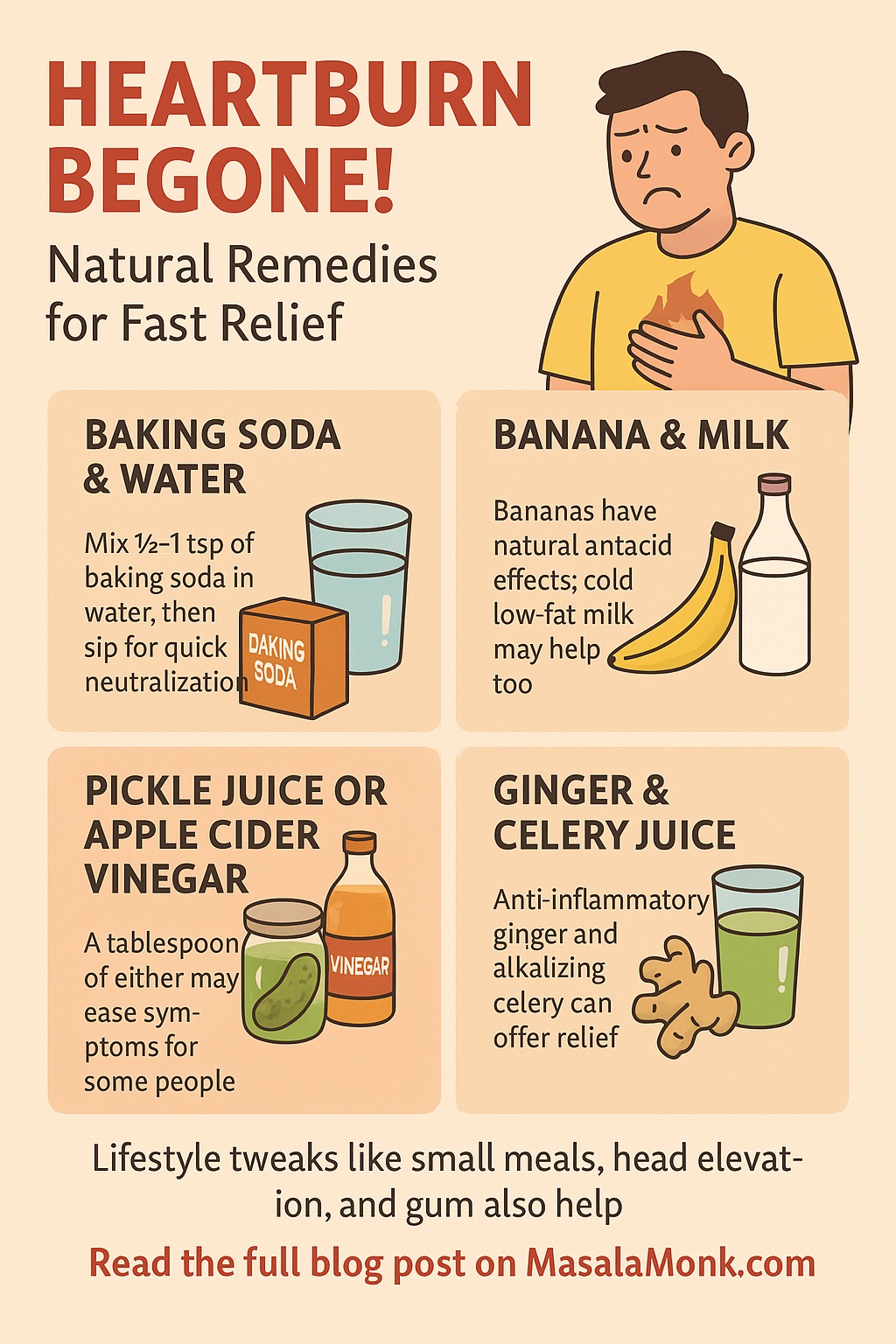
If you’ve ever been sidelined by a sore throat—whether from a nasty cold, allergies, or too much yelling at a concert—you know how desperate you can feel for quick relief. Among the many home remedies out there, one humble root keeps cropping up: ginger.
But does ginger really help a sore throat, or is it just another old wives’ tale? In this post, we’ll dive deep into the science, gather real user feedback, and give you the most practical ways to use ginger when your throat needs soothing.
Why Ginger? The Science Behind the Soothing
Ginger (Zingiber officinale) has been treasured for centuries in Asian, Middle Eastern, and even Western folk medicine. Modern research is starting to explain why. Here’s what we know so far:
1. Anti-Inflammatory Action
Ginger contains natural compounds—especially gingerols and shogaols—that have proven anti-inflammatory and antioxidant properties. In lab studies, ginger can suppress the same inflammatory molecules (like IL-8) that make your throat red, swollen, and painful when you get sick .
2. Antimicrobial Effects
Ginger has been shown in several studies to inhibit the growth of some bacteria and viruses, including Streptococcus pyogenes (a common cause of bacterial sore throat) . This suggests it could help slow down the cause of your sore throat, not just mask the pain.
3. Immune Support
Ginger may help support immune activity, helping your body clear the infection that’s causing your discomfort .
4. Soothing Sensation
Beyond the biochemistry, the spicy warmth of ginger feels soothing and can help open up nasal passages, thin mucus, and make breathing easier.
What Does the Latest Research Say?
Direct clinical trials using ginger specifically for sore throat are still rare. But recent research is compelling:
- A 2022 Chinese clinical trial gave ginger supplements to COVID-19 patients (who often have sore throat and cough). The group taking ginger had shorter hospital stays and improved respiratory symptoms.
- 2024 systematic reviews confirm ginger’s strong anti-inflammatory and antioxidant effects—essentially, it creates a less hostile environment for your throat to heal.
- Topical mouthwashes with ginger have also shown reductions in oral inflammation—suggesting that gargling with ginger may have throat benefits too .
The bottom line: While we still want more direct studies, there’s good scientific reason to use ginger for sore throat discomfort—especially in combination with other gentle remedies like honey.
Real People, Real Experiences
Science is great, but what do everyday people say? User reviews and social threads are packed with stories about ginger’s effects on sore throats:
- Rapid Relief: “The Organic No Joke Ginger Shot completely cleared up my sore throat less than 30 seconds after downing it. Highly recommended!”
—Reddit user - Classic Home Remedies: “Honey, Ginger & Lemon, perfect for coughs or sore throats… This stuff works wonders…”
—Reddit /r/slowcooking - A Word of Caution: “I advised someone to drink ginger tea for his cough and itchy throat… it caused heartburn…”
—Reddit /r/nutrition
Most users find relief from fresh ginger tea or concentrated shots. A few, especially those sensitive to spicy foods or with reflux, do report heartburn or mouth irritation.
Practical Ways to Use Ginger for a Sore Throat
Here’s how you can harness ginger’s soothing power—safely and effectively:
1. Ginger-Honey-Lemon Tea (Classic and Reliable)
Ingredients:
- 1–2 inches of fresh ginger root (sliced or grated)
- 1–2 tablespoons honey
- Juice from half a lemon
- 2–3 cups hot water
How to Make:
- Place sliced or grated ginger in a mug or teapot.
- Pour in hot (not boiling) water. Let steep for 10–15 minutes.
- Add lemon juice and honey to taste.
- Sip slowly while warm. Repeat 2–3 times a day.
Why it works: The warmth soothes, honey coats and calms, and ginger reduces inflammation.
2. Ginger Shots (For the Brave!)
Ingredients:
- 2 inches fresh ginger, peeled and juiced (or blended and strained)
- Juice of 1/2 lemon
- 1 teaspoon honey (optional)
- Pinch of cayenne (optional)
How to Make:
- Juice the ginger, or blend with a little water and strain.
- Mix with lemon and honey.
- Drink in one go—brace yourself for the burn!
Why it works: Intense and fast-acting; great for when you need rapid relief. Not for those with sensitive stomachs.
3. Ginger Gargle
Ingredients:
- 1 cup warm water
- 1/2–1 teaspoon ginger powder or juice
- Pinch of salt
How to Make:
- Dissolve ginger and salt in warm water.
- Gargle for 30 seconds, then spit. Repeat 2–3 times daily.
Why it works: Direct application to inflamed tissues can speed relief. Use with caution if you’re sensitive.
4. Store-Bought Ginger Remedies
Ready-made ginger teas, lozenges, or “ginger shots” are widely available in health food stores. Read the ingredients—go for high ginger content, low sugar, and as natural as possible.
How Much Ginger Should You Use?
- Safe daily dose: Most studies use 1.5–3 grams per day of ginger, divided into two or three servings.
- Side effects: Too much ginger may cause heartburn, dry mouth, or mild digestive upset. People on blood thinners, or with gallstones or ulcers, should talk to a doctor first.
Frequently Asked Questions
1. Can ginger actually cure a sore throat, or just relieve symptoms?
Ginger cannot “cure” a sore throat caused by infections, but it can reduce inflammation, relieve pain, and possibly help your body recover faster. It’s best used as a complementary remedy alongside rest, hydration, and—if needed—medical treatment.
2. Is it better to use fresh ginger, powdered ginger, or ginger supplements?
Fresh ginger generally contains the highest amount of active compounds. Powdered ginger is effective but slightly less potent; supplements can be convenient but vary in quality. For sore throat, teas and infusions made from fresh or powdered ginger work best.
3. How much ginger should I consume per day for a sore throat?
Most research suggests 1.5 to 3 grams of ginger per day is both safe and effective for adults. Start low to test your tolerance. Too much ginger may cause stomach upset.
4. Can I give ginger tea to children with a sore throat?
Yes, ginger tea is safe for most children in small amounts. Use mild preparations, and avoid giving honey to children under 1 year old due to the risk of botulism. Check with a pediatrician if your child has other health conditions.
5. How quickly will I feel relief after using ginger?
Some people report relief within minutes to hours, especially with strong ginger teas or shots. Others may notice more gradual improvement over a few days, depending on the severity of their symptoms.
6. Are there any side effects to watch out for?
Possible side effects include heartburn, mouth or throat irritation, upset stomach, and mild diarrhea. People on blood thinners or those with gallstones should consult a doctor before using ginger regularly.
7. Can I use ginger alongside antibiotics or other medications?
In general, yes, but ginger can interact with blood thinners and certain medications. Always check with your doctor or pharmacist if you’re on prescription medications.
8. Is ginger safe to use during pregnancy for sore throat?
Ginger is generally considered safe for short-term use in small amounts during pregnancy and is commonly used for morning sickness. However, high doses are not recommended—consult your healthcare provider for personalized advice.
9. What’s the best way to prepare ginger for sore throat relief?
Steep 1–2 inches of fresh, sliced or grated ginger in hot water for 10–15 minutes, then add honey and lemon. Drink warm. You can also try ginger gargles or concentrated ginger shots, but start with small amounts to test your comfort level.
10. When should I see a doctor about my sore throat?
Seek medical attention if your sore throat lasts longer than a week, is severe or worsening, is accompanied by fever over 101°F (38.3°C), trouble swallowing or breathing, rash, or white patches in your throat. Ginger is supportive, not a substitute for proper medical care when needed.
Final Thoughts: Should You Try Ginger for Sore Throat?
If you want a natural, affordable, and time-tested remedy, ginger is a great place to start. Science supports its anti-inflammatory and antimicrobial benefits; thousands of people vouch for its soothing effects. It’s easy to prepare, widely available, and—when used with a little care—quite safe.
Remember: If your sore throat is severe, lasts more than a few days, or is accompanied by fever, rash, or difficulty breathing, see a medical professional.
📢 Ready to Try It?
Next time your throat feels scratchy or raw, brew up a mug of ginger-honey-lemon tea, or try a ginger shot. Share your experience and let us know what worked best for you—your story could help others on their healing journey!
References:
- Frontiers in Nutrition, 2024
- Nutrition & Metabolism, 2022
- Healthline: Ginger for Sore Throat
- LWW Journals, 2024
- Reddit user feedback
Have more questions or your own remedy to share? Drop a comment below!













